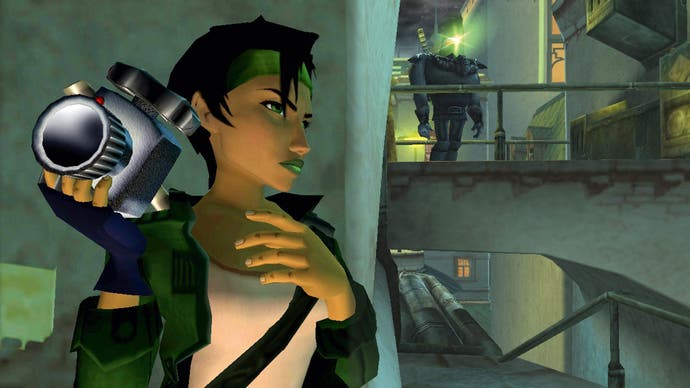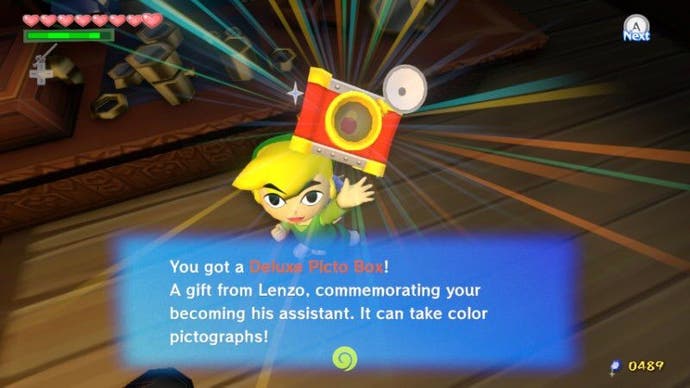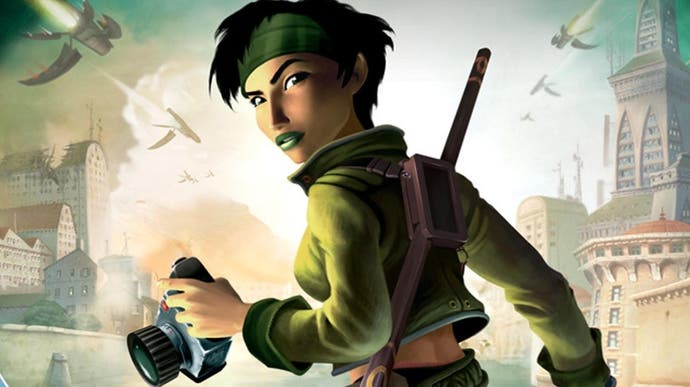The best thing a game can give you is a camera
Snap.
Holding a camera in your hands has a subtle effect on the nature of reality around you, I reckon. And that's true even when the reality around you isn't that real. In the Earth Temple, somewhere across the Great Sea, I once asked Medli to move to the left a little, just so I could get a picture of her in front of a huge golden sun of some kind.
I could not ask Medli, of course. I had to nudge her, and to move around in a way that meant she might follow and stop where I wanted her to stop. Then I raised the camera - wood and brass, I can almost remember the weight of it, the warmth of varnish and the chill of metal - and I took the picture.
Medli's name has been long forgotten. I had to look it up just now, ditto the Earth Temple. But twenty years after the fact I can remember the moment. I remember, really, two things about The Wind Waker, the glorious Zelda game in which Medli lives. The first thing is looking through a telescope on Dragon Roost Island and seeing a distant toothpick of stone jutting from the water with a long-neck bird perched in a nest on top. A sense of observing from a way off, almost illicit. The second is getting Medli to move for the picture. The Picto Box! And both memories, I now think, are probably about the same stuff - the way a world surprised me by feeling real.

What does a camera do for a game? A while back I would have said that it gives you the triggery fun of a firearm but without the bloodletting to splatter across your conscience. Beyond Good & Evil - that game gives you a camera. You're not a soldier, you're a war reporter. You look through the viewfinder and snap moments of wrong-doing. But listen: you also have a staff to hit people with, and a little disc-firing doodad to snipe out people's oxygen lines. You are a war reporter, but pretty soon you're also a soldier.
Let's try again. I'm thinking of all this because Pokémon Snap is back, and I have only just realised after all these years that Pokémon Snap is not snap in the sense of - Two aces! Snap! - but snap in the sense of the shutter firing. Pokémon abound and you take pictures of them. You have a camera in your hand. And this made me think, not just that there are a lot of games that give you a camera, but that I always tend to like those games. More than that, I like them for the same reasons. They feel more engrossing, more enfolding. Games with cameras tend to get me in a bear hug.
So what did the camera do for me in Wind Waker? When I think back to the Medli moment, and when I am very honest to the point of feeling a bit silly, I'll tell you this: I felt like I wasn't alone in that Earth Temple. Wind Waker is a Zelda game in which you sometimes stumble through dungeons with companions, but it was only when I had the camera that I truly experienced the fiction of this. I wanted Medli to move, not to hit a switch or step on a pressure plate, but because I was after a shot. Her unwillingness to felt like part of her personality. I felt like we had a startlingly human moment as I tried to position us both.

This is the heart of it for me. An imaginary camera makes an imaginary reality more real, in surprising ways. They make me think: oh, I am here, and I want a picture of that. So 'here' and 'that' become real in a way that is separate from the game mechanics, from the idea of graphics and whether there's too much bloom or if the grass looks convincing. They make me look beyond whether things are convincing, and so I am merely convinced by them.
As a result, the camera feels more real, somehow, than the other gadgets you're given in games. In Zelda I love the boomerang and the hookshot, but the camera from Wind Waker, in its applicability to everything and nothing, the ease with which it rode and perhaps revealed the fluttering current of my whimsy, it felt singularly filled with promise. I thought about it and how it worked. I felt a thrill whenever I used it - a nervous thrill I still get with cameras, even the one on my phone. Don't want to break it!
If I had to sum it up I would say that there is the player and the game being played, and the camera seems to exist slightly further out in a space of its own between the player and the game, between the will directing the controller and the on-screen world that can be controlled. Why? Because it can capture that world - and often for no more reason than the pleasure of doing so.










